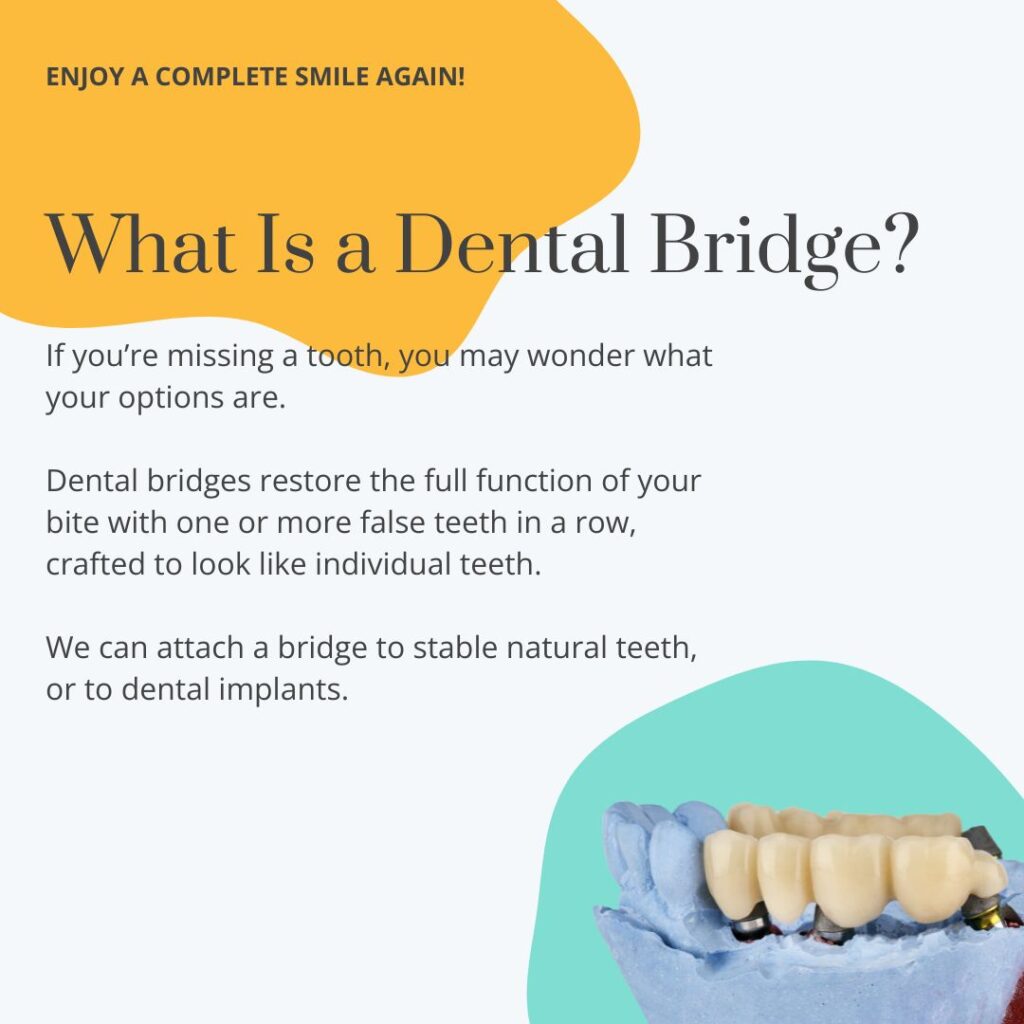What Are Dental Bridges?
A dental bridge is a custom-made restoration designed to close the gap left by one or more missing teeth. It “bridges” the space using your natural teeth or dental implants for support, creating a complete, functional smile that looks and feels natural. If you’re considering dental bridges in Sebastopol, our team at Oak Tree Dental is here to help you every step of the way.
Dental bridges can be supported by strong, healthy teeth on either side of the gap or anchored to dental implants to replace several teeth in a row. We’re proud to offer fully customized dental bridges that will blend seamlessly with your smile.
What Are the Benefits of Dental Bridges?
Dental bridges can:
- Make it easier to speak clearly.
- Keep neighboring teeth from shifting out of place.
- Restore a natural, full smile you’ll feel confident about.
- Bring back proper function to your bite for comfortable eating.
- Protect your remaining teeth from excessive wear.
- Maintain the natural shape of your face.
Types of Dental Bridges
At Oak Tree Dental, we offer a variety of dental bridges in Sebastopol to fit your needs:
- Traditional Dental Bridges: These use crowns on the teeth next to the gap for support and are known for their durability and reliability.
- Cantilever Bridges: Ideal when there’s only one supporting tooth next to the gap, or only enough space for one dental implant. These are used in specific situations where other options aren’t possible.
- Implant-Supported Bridges: Anchored to dental implants for maximum stability and long-lasting results.
Our team will help you choose the right bridge type based on your unique needs and goals.

What Is the Process of Getting a Dental Bridge?
Getting a dental bridge is a straightforward and personalized process:
- Initial Consultation: We’ll evaluate your smile and discuss your goals and treatment needs.
- Preparation: For traditional bridges, the teeth next to the gap will be prepared for crowns. For implant-supported bridges, we’ll first place the implants.
- Impressions: Precise molds or scans will be taken to ensure your custom bridge fits perfectly.
- Temporary Bridge: While your permanent bridge is being made, you may need to wear a temporary one to protect your teeth.
- Placement: Once your custom bridge is ready, we’ll secure it in place and make any necessary adjustments.
At Oak Tree Dental, our custom dental bridges are designed to rebuild your smile and boost your confidence in no time.
Bridges vs. Other Tooth Replacement Options
When replacing missing teeth, it’s important to consider all your options. Here’s how dental bridges compare:
- Dental Bridges: Long-lasting, more affordable than implants, and more secure than removable dentures.
- Dentures: A cost-effective, removable option, but they don’t fully restore the function of your bite.
- Dental Implants: The most durable and longest-lasting option but typically more expensive up front.
Not sure which option is right for you? The team at Oak Tree Dental is here to guide you through your choices and help you decide what’s best for your smile and budget. We’ve helped many Sebastopol patients find the perfect solution to restore their smiles.
Ready to Rebuild Your Smile with Dental Bridges in Sebastopol?
At Oak Tree Dental, we believe everyone deserves a smile they’re proud to show off. Get in touch today or book your appointment through our web portal to schedule your consultation for dental bridges in Sebastopol. We can’t wait to help you restore your confidence and enjoy a complete smile again!



